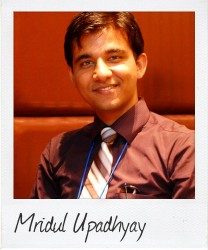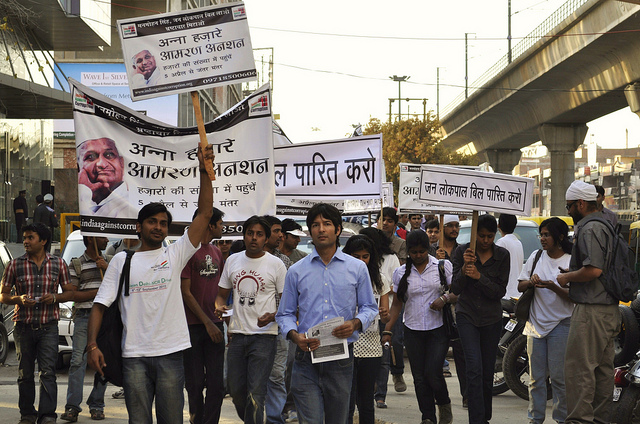"Non-violence succeeds in getting bill passed"
February 28th, 2014 India has passed a historic bill enabling the investigation of corruption, writes Mridul Upadhyay, 22, a Commonwealth Correspondent from New Delhi in India, and in doing so underlined the power of Gandhi’s non-violent protests.
India has passed a historic bill enabling the investigation of corruption, writes Mridul Upadhyay, 22, a Commonwealth Correspondent from New Delhi in India, and in doing so underlined the power of Gandhi’s non-violent protests.
What Mahatma Gandhi did in his devotion to non-violence seems impossible now. We give priority to money, power and success over human rights and others’ perspective of development. We see violence, hatred and fear everywhere. In such a socio-political environment, non-violence and hunger strikes for a cause seem impractical theories. But there are many causes to stand against.
I work hard for my profession. I love travelling and volunteering for disadvantaged groups, but can’t get long holidays because of work load and unsecure financial support. I am living far from my family because of the profession. Living in a low income country has caused comparatively low wage jobs for me but whatever I earn, I give a good share to the government under various names, called taxes, thinking of supporting the development of the nation.
And on the other side, the so-called poor politicians and higher level administrative officer are able to accumulate wealth and become billionaires during their tenure. We know it is not magic but remains a surprise. Cases of corruption seldom get solved in India.
That is the money of very hard working common people, making many sacrifices to earn their living. For all such reasons, nobody in power has a right to treat us as the dumb common men. If somebody is taking away money like this, is it not enough of a reason to stand against him? How can we allow such thieves to steal our money?
We may behave violently, killing such thieves. But will it change the system which our enlightened leaders have designed for us to live in harmony, or overall development?
We have one more way, the way of stronger people; the Gandhian way, the way of non-violence. India got freedom in 1947 through such non-violent movements.
After 20 years of independence when the era of highly-motivated politicians was ending, the social activists thought about the possible wrong use of power and introduced the Jan Lokpal Bill to investigate efficiently all corruption-related cases. But it was already late. Such a bill was first introduced in 1968, then nine more times in 40 years till 2011, but none was passed in the assembly to become a law.
The politicians close to corruption did not support a watchdog over their work, which is badly affected by corruption at various levels in the system. Almost all the national political parties became directly a part of ruling government in majority or minority, but they keep cheating the common people and did not support the bill.
Finally in April 2011, following Gandhi’s principal of non-violence, a 76-year-old retired army man ‘Anna Hazare’ launched a hunger strike to exert pressure on the Indian government to enact a stringent anti-corruption law, vowing to continue until the bill was passed into law. Soon it became a mass movement supported by many social activists. Common people supported Anna but political leaders were busy enjoying “black” money. People peacefully marched on the streets of the capital city but the political leaders ordered police force to suppress the movement.
It continued for a month. Many were beaten badly with batons and arrested. Anna was hospitalized because of poor health due to continuous fasting. Finally some political leaders accepted some of their demands, just to break the continuous fast of Anna Hazare, because of public and media pressure. But the bill could not become a law.
In time, some left the movement because of ideology clashes. Some left because they could not stand against the allegations against them. May be they were also part of corruption directly or indirectly.
But Anna kept fasting again and again for days. And finally after two years of continuous struggle, the Jan Lokpal Bill was passed in the national assembly on 18th Dec, 2013 with several amendments.
So now after eight unsuccessful attempts over the last five decades, India took the historic step of enacting the Lokpal law by which an anti-corruption watchdog would be established. It will have in its purview even the office of the Prime Minister.
This success has affirmed our belief in non-violence and strength in unity. We owe it to Gandhi and Madiba for teaching us these lessons. We shall always carry their basic ideologies with us.
“This story has been produced under the aegis of the Metta Center for Nonviolence Media Fellowship.”
photo credit: Deepankar Raj via photopin cc
…………………………………………………………………………………………………
About me:
A thinker, a social volunteer, a mechanical designer, a theater artist, a guitar player, a lyrics-writer, an amateur sketch artist, a cook, a traveler, a wannabe civil servant – there are many phrases I enjoy trying on me to describe what I see myself as.
…………………………………………………………………………………………………
Opinions expressed in this article are those of the author and do not necessarily represent the views of the Commonwealth Youth Programme. Articles are published in a spirit of dialogue, respect and understanding. If you disagree, why not submit a response?
To learn more about becoming a Commonwealth Correspondent please visit:
http://www.yourcommonwealth.org/submit-articles/commonwealthcorrespondents/
…………………………………………………………………………………………………




